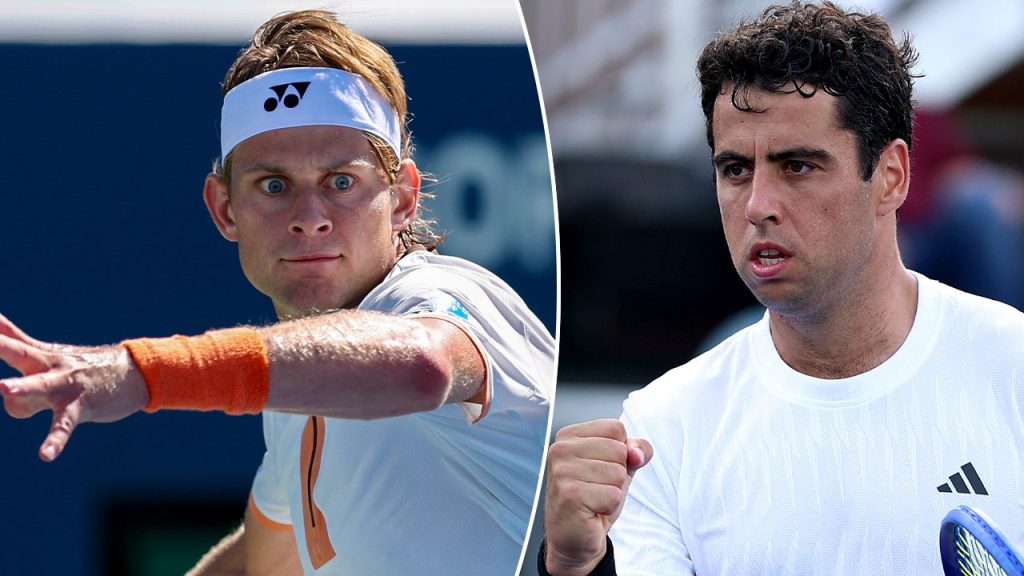Tempers Flare at the U.S. Open: Munar and Bergs Clash Over Court Etiquette
In the high-pressure environment of the U.S. Open, tennis skills weren’t the only thing on display as Spain’s Jaume Munar and Belgium’s Zizou Bergs became embroiled in a heated post-match exchange that captured attention at Flushing Meadows. Following Munar’s straight-sets victory (6-3, 7-6(4), 6-4), what should have been a routine handshake at the net instead turned into a tense confrontation, highlighting how even the smallest court behaviors can escalate in the crucible of Grand Slam competition. The dispute centered around Bergs’ grunting during play, which Munar found distracting and possibly unsportsmanlike. After the match, Bergs expressed surprise at Munar’s irritation, explaining to reporters: “He was apparently not so happy with my grunting during the match, which I didn’t know. I said, ‘It’s nothing towards you at all.'” These moments of friction reveal the complex psychological dimension of tennis, where players must navigate not only the technical aspects of the game but also unwritten codes of conduct and mutual respect while under immense scrutiny.
The confrontation wasn’t the only dramatic moment during the match. Earlier, Bergs had been penalized for ball abuse after forcefully hitting a ball into the stands while trailing 40-love. This outburst resulted in an automatic loss of point, giving Munar the game and a crucial 5-4 lead in the third set. The incident proved pivotal, as Munar capitalized on the advantage to close out the match in straight sets. Such displays of frustration are not uncommon in tennis, where emotions run high and the psychological battle often determines outcomes as much as physical skill. For Bergs, the lapse in self-control came at a particularly costly moment, highlighting how emotional management remains one of the sport’s greatest challenges, especially for less experienced players on the Grand Slam stage.
When asked about the confrontation, Munar offered a measured response, acknowledging the disagreement while avoiding further escalation: “I think he did some wrong things, but he said it was not on purpose. So, it’s not much more than that.” This diplomatic answer reflects the balancing act players must perform – standing firm on competitive boundaries while maintaining professional relationships on tour. The exchange exemplifies how players often perceive the same match events quite differently, with Munar experiencing Bergs’ grunting as disruptive while Bergs saw it as a natural part of his game expression. Such disconnects in perspective frequently become the basis for tension in a sport where competitors must share intimate court space under stressful conditions.
Beyond the controversy, the match represented a significant career milestone for Munar, who advanced to the Round of 16 at a Grand Slam for the first time. This achievement marks a breakthrough moment for the Spanish player, who has been steadily building his career on the ATP tour. For many professional tennis players, reaching the second week of a major tournament represents crossing a threshold from journeyman status to potential contender. Meanwhile, for Bergs, ranked outside the top 70, the tournament still offered valuable experience despite the disappointing conclusion, as he made his main-draw debut at the U.S. Open. These contrasting trajectories highlight tennis’s constantly evolving competitive landscape, where established players strive to reach new heights while newcomers fight to make their mark.
The incident between Munar and Bergs isn’t occurring in isolation but rather follows a pattern of tense moments that have characterized this year’s U.S. Open. The pressure-cooker environment of the final Grand Slam of the season often brings out strong emotions, with players feeling the weight of their last major opportunity of the year. The New York crowd, known for its energy and occasional rowdiness, adds another layer of intensity that can affect players’ composure. These factors combine to create an atmosphere where small irritations can quickly escalate into visible conflicts, providing dramatic storylines that sometimes overshadow the tennis itself. Tournament officials must carefully navigate these situations, ensuring that healthy competition doesn’t cross into unsportsmanlike conduct while still allowing for the natural expression of emotion that makes the sport compelling.
Looking ahead, Munar’s breakthrough run continues with a fourth-round match against Italy’s 10th-seeded Lorenzo Musetti, representing another opportunity to extend his best-ever Grand Slam performance. This upcoming challenge will test whether Munar can build on the momentum from his victory over Bergs and manage the increasing pressure that comes with advancing deeper into a major tournament. For tennis fans, these narratives of personal achievement, emotional struggles, and interpersonal dynamics add rich layers to the sporting spectacle. While technical brilliance and athletic prowess remain at the heart of tennis, it’s often these human elements – the conflicts, the breakthroughs, the disappointments, and triumphs – that create the most memorable moments and forge the deepest connections between players and audiences. As the tournament progresses toward its conclusion, both the athletic achievements and these compelling human dramas will continue to unfold on the courts of Flushing Meadows.


